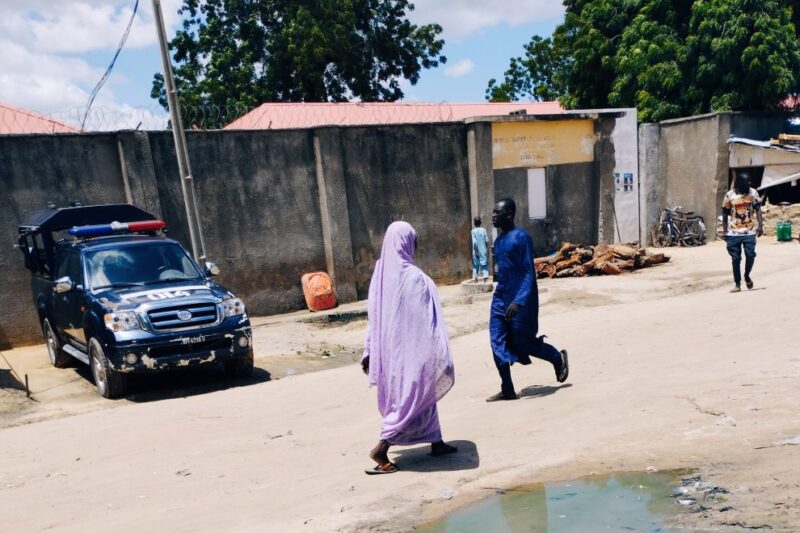“They flogged us mercilessly and gave us frequent beatings – even the nursing mothers among us and those who are pregnant. Our bodies hurt all over, especially our necks, knees and backs. They were ruthless and unkind and kept threatening us with death.”
So said one of the 30 remaining women who were abducted on Tuesday, August 21, while they were collecting firewood in the forest along the Maiduguri-Mafa road in Borno State.
Originally, the Jamā’at Ahl as-Sunnah lid-Da’way Wa’l-Jihād (JAS), better known as Boko Haram, insurgents abducted 48 women. They released four elderly women but kept the others for ransom.
Nine of the women were released on Wednesday after residents from the Shuwari internally displaced persons’ camp in the Jere Local Government Area got together to collect whatever money could to pay the ransom.
Five women managed to escape, much to the ire of the insurgents who sent a dire warning to the relatives of the 30 remaining women, saying they would slaughter them if the ransom was not paid promptly.
The women were held for four days and released on Friday last week when their relatives secured enough money to pay the ransom of ₦2 million and food items, such as bags of rice and jerrycans of cooking oil.
The women told RNI that they were traumatised. They said they had been through the most harrowing experience of their lives. They described their captives as cruel and ruthless, saying not even the nursing mothers or pregnant women were treated with any respect.
They said the ordeal had left them not only physically injured but also in need of psychological support. They hoped government authorities would help them to get proper medical treatment, including mental health support, such as counselling, and psychosocial support. They said that was the only way their lives would go back to normal.
Falmata Umara, a nursing mother, said: “They flogged us mercilessly and for no reason at all. We slept in the bushes deep inside the forest on the ground without mattresses or nets. We were bitten by insects and other bugs.”
She said that as she had left her baby at home before the ambush, her breasts hurt and she had to express milk to stop the pain and get relief. She poured the milk on the ground.
“I found it extremely distressing and was constantly thinking about my baby,” Falmata said.
“We were released by the insurgents only after our relatives paid the huge ransom. When I got home, I went to a clinic because I was feeling sick, physically and mentally.”
Ya Gana Grema told RNI that her eyes were injured during the “excessive floggings”.
“All of us became sick. They treated us ruthlessly. I think we are all feeling the effects now. We feel depressed, traumatised and anxious all the time. I’m sure we are also suffering from hypertension. Some of us are scared to even go outside.
“Those I feel most sorry for are the pregnant women and nursing mothers. They, like the rest of us, were constantly beaten and flogged. We suffered from severe headaches and we were in constant pain. Our bodies ached.”
She said most of the women did not have money to get specialist care, so they were sitting at home suffering.
Mohammed Abba Fugu, a doctor and psychologist at the Federal Neuro-Psychiatric Hospital in Maiduguri said that most people who were abducted needed mental health support, proper counselling, psychotherapy as well as psychosocial support because of the maltreatment and abuses they were forced to endure.
“Many experience rape, sexual harassment and molestation, beatings, manhandling, hunger, thirst and insomnia. If they don’t get medical help, they often end up with serious mental health problems.”
Fugu said: “Many suffer from post-traumatic stress disorder [PTSD], which develops in some people who have witnessed or experienced a shocking, scary or dangerous event, or trauma from physical and/or sexual assaults and abuses. An accident, disaster or other serious events, such as kidnappings or abductions, can also result in a patient suffering from PTSD.
“Some of the signs and symptoms include vivid flashbacks of what happened, intense panicking upon hearing stories of related dangerous or scary events, intrusive thoughts or images, nightmares, intense distress at real or symbolic reminders of the trauma and physical sensations, such as pain, sweating, nausea and trembling.
“People with mental health problems need proper treatment through counselling, biological evaluation [treatment of open wounds and diseases], psychological assessment or evaluation [mental health treatment] and social evaluation [supporting the victims with what they lost in terms of property].”
He said it was imperative that the government, non-governmental organisations and humanitarian agencies get the 48 women properly assessed and treated because what they went through could affect them for the rest of their lives.
SHETTIMA LAWAN MONGUNO









